Key takeaways:
- Grassroots leadership is about mobilizing community passions and fostering authentic connections to inspire collective action.
- Pro-life advocacy emphasizes the importance of personal narratives to challenge misconceptions and create understanding among diverse audiences.
- Facing challenges, such as limited resources and public skepticism, can strengthen community bonds and enhance resilience in advocacy efforts.
- Future goals include developing structured training programs to empower the next generation of advocates through education and support.
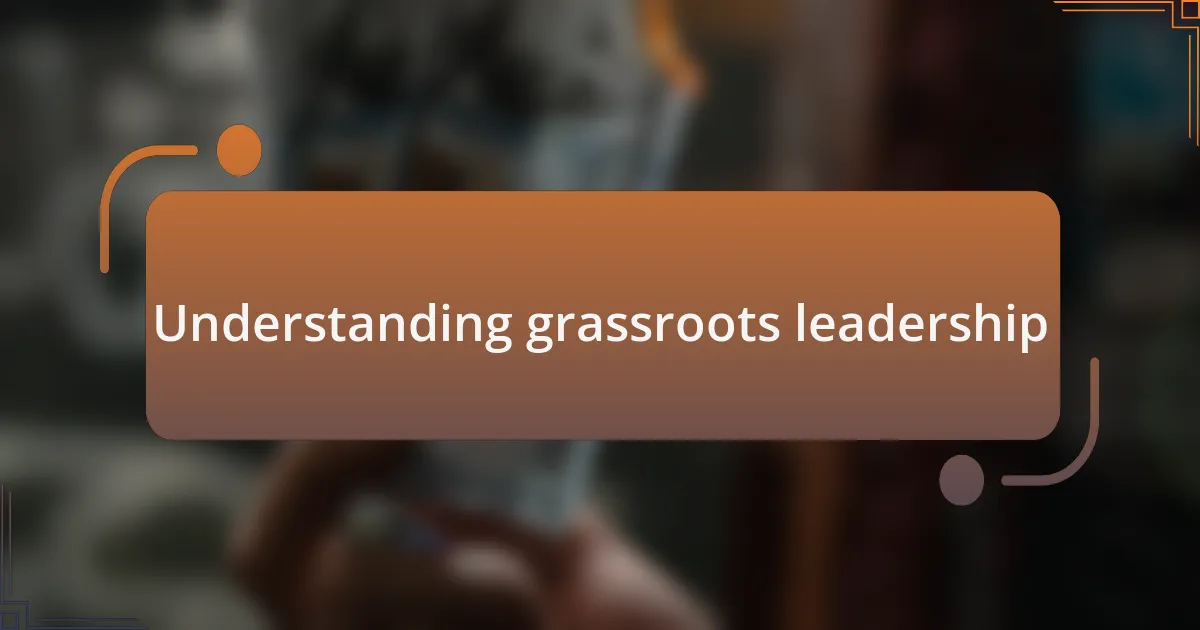
Understanding grassroots leadership
Grassroots leadership is fundamentally about mobilizing the community to effect change from the ground up. I remember my first experience with grassroots efforts: it was exhilarating to see everyday people come together with passion, each sharing their unique voice and perspective. This collective power often astonishes me; how can such small, individual efforts create waves of impact?
At its core, grassroots leadership thrives on connection and personal relationships. I learned that it’s not just about rallying people; it’s about understanding their concerns and dreams. Have you ever noticed how deeply people engage when they feel heard? I’ve found that authentic listening can transform a simple meeting into a passionate movement, where individuals feel truly valued and inspired to take action.
Moreover, grassroots leaders often face challenges that test their resolve, like skepticism from those in authority or funding obstacles. I recall a meeting where we feared losing momentum, but our shared commitment reignited our dedication. It made me realize that setbacks are merely opportunities for growth and that resilience is often the backbone of effective grassroots leadership. How can we harness our challenges to strengthen our resolve? In my experience, facing obstacles together only solidifies the bonds within the community and inspires greater determination.
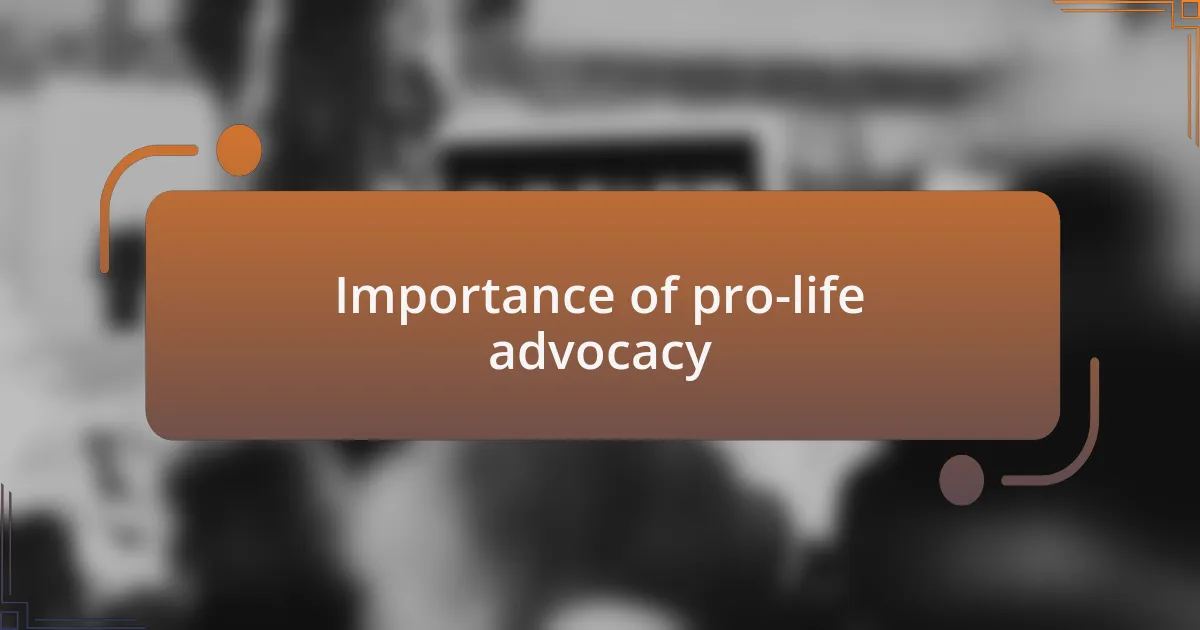
Importance of pro-life advocacy
Pro-life advocacy is crucial because it represents the voice of the voiceless, particularly the unborn who cannot defend themselves. I still remember the first time I stood up at a local event and shared my thoughts on this issue; the support I felt was overwhelming. It was a pivotal moment for me, reinforcing the belief that every life has intrinsic value and is deserving of protection.
Moreover, pro-life advocacy helps foster a culture of respect for life at all stages. When advocates gather to share their stories and experiences, it creates an atmosphere of understanding and compassion. I have seen firsthand how personal stories can touch hearts and open minds, creating an opportunity for dialogue that challenges stereotypes and misconceptions surrounding the pro-life movement. Hasn’t everyone experienced a moment when they realized their perspective needed to evolve? Those conversations can spark profound change.
Finally, engaging in pro-life advocacy builds a community united by shared values and a common purpose. I’ve witnessed how connections formed through this shared commitment can evolve into powerful alliances. These partnerships enable us to campaign more effectively for life-affirming policies. Every time I connect with someone equally passionate, it reinforces my belief that together, we can make a notable difference in shaping the future of our society. Wouldn’t you agree that a united voice is more powerful than one alone?
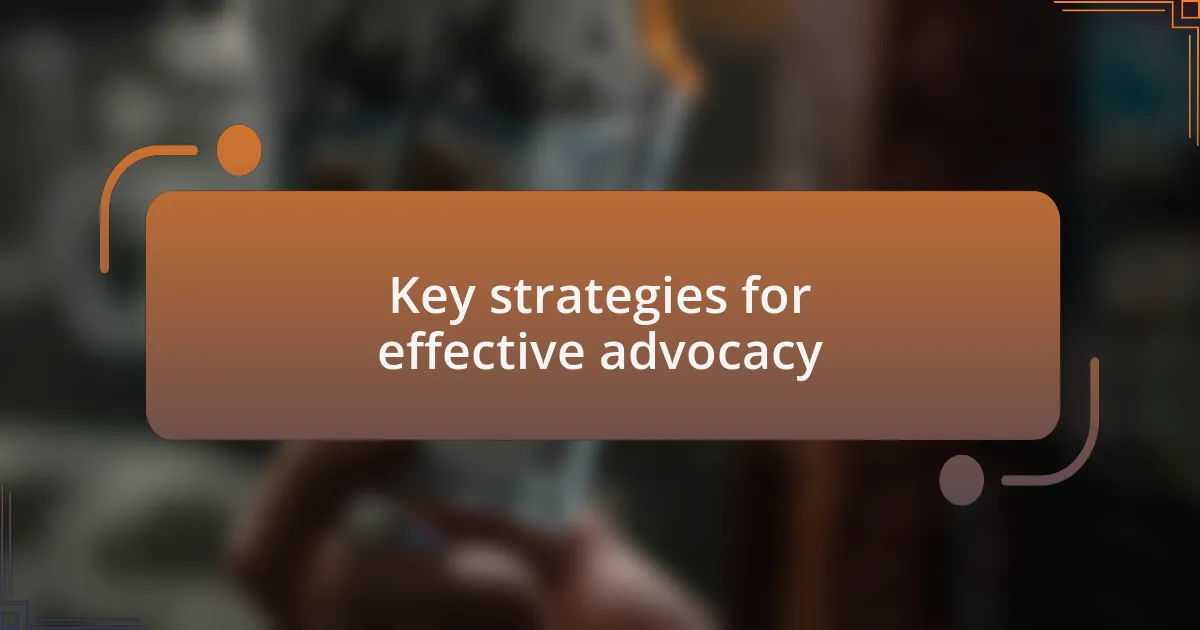
Key strategies for effective advocacy
One key strategy for effective advocacy is storytelling. Personal narratives can be incredibly impactful; I recall a time when I shared the story of a friend who chose life amidst overwhelming circumstances. The room was silent, and I could see tears forming in people’s eyes. It was a powerful reminder that stories can bridge gaps and humanize abstract debates. Isn’t it interesting how a single story can shift perceptions?
Building relationships within your community is another vital strategy. I often attend local gatherings to network with like-minded individuals and influential community leaders. These connections spark discussions, share insights, and create opportunities for collaboration. I remember meeting a passionate teacher who later invited me to speak at her school about the value of life. Those spontaneous connections can lead to unexpected and impactful advocacy efforts.
Lastly, persistence is essential. Advocacy is not a sprint but a marathon. I vividly recall a campaign I had nearly given up on; after months of hard work and few results, we finally received media attention. It reminded me that perseverance can lead to breakthroughs. Have you experienced a situation where holding on during tough times eventually paid off? Trusting in the process strengthens our resolve and ultimately enhances our effectiveness in advocacy.
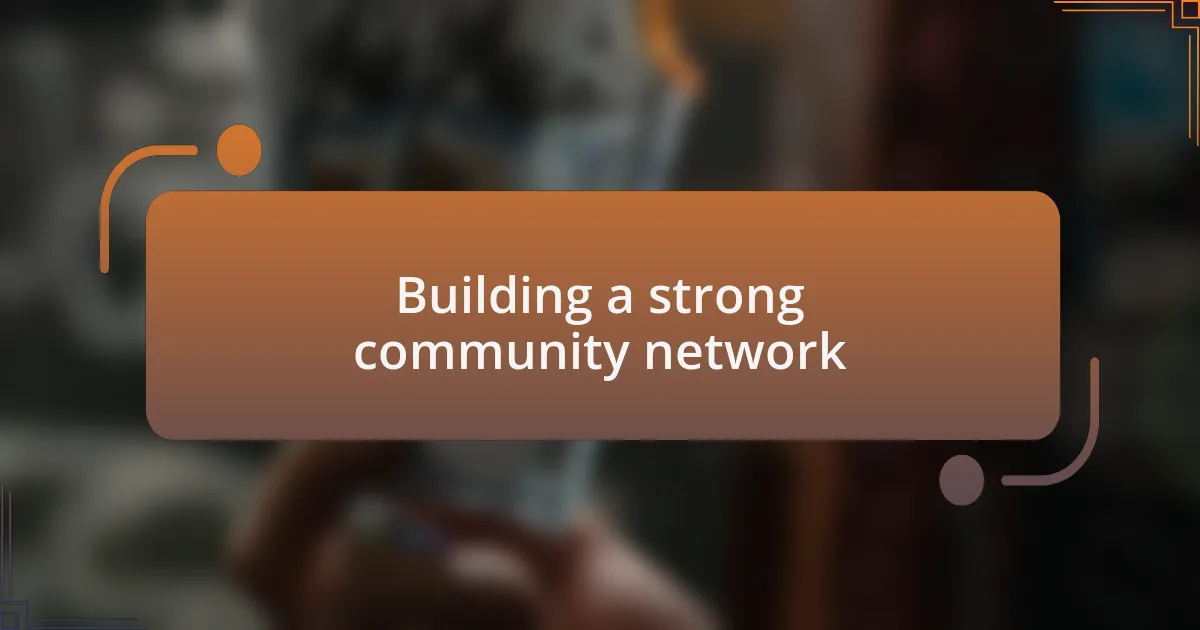
Building a strong community network
To effectively build a strong community network, I believe in the power of authentic connections. I remember hosting a small dinner with a few fellow advocates. Sharing our experiences over a meal not only strengthened our bonds, but it also created an environment where ideas flowed freely. Isn’t it fascinating how personal interactions can ignite passion and unite people toward a common goal?
Another aspect of developing a community network is fostering open communication. During a local event, I once set up a casual feedback booth where people could express their thoughts about pro-life initiatives. The honest conversations that emerged helped me understand community concerns better, and I even made some long-lasting friendships that stemmed from those discussions. Have you ever noticed how listening can often lead to more profound understanding?
Finally, leveraging social media can also bolster community engagement. I recall starting an online group focused on pro-life discussions. It wasn’t just about sharing articles; it became a space for support, encouragement, and diverse opinions. Seeing the camaraderie grow among participants showed me that digital platforms could bridge geographical gaps and strengthen community ties. How can we utilize technology to enhance our grassroots efforts even more?
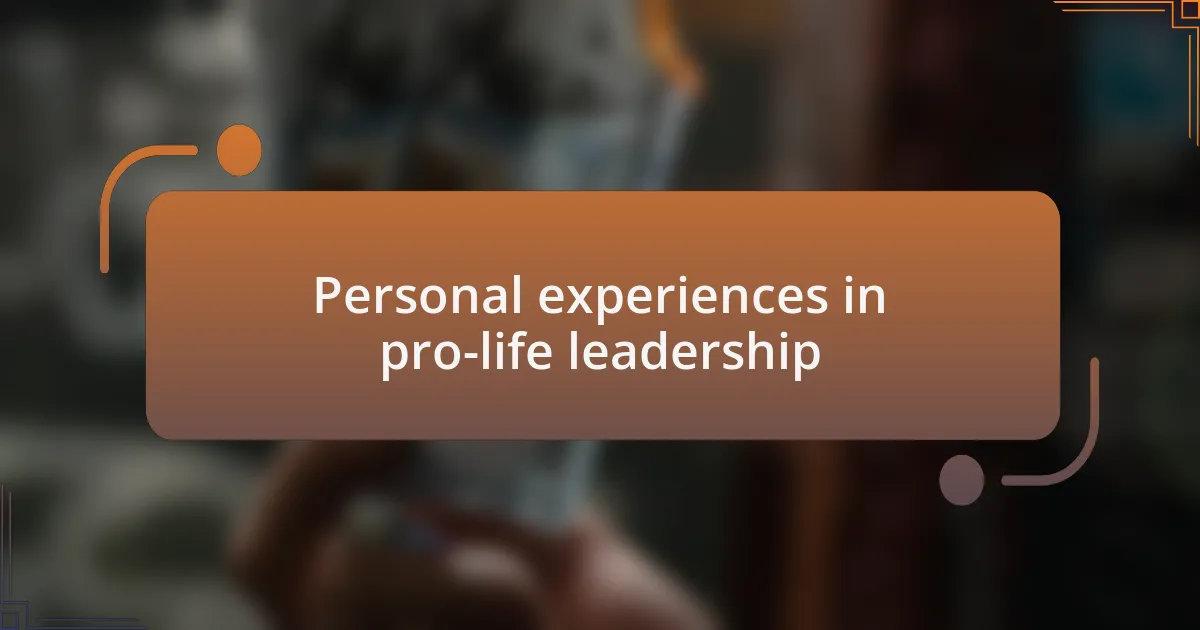
Personal experiences in pro-life leadership
In my journey through pro-life leadership, I vividly recall my first experience rallying support for a local event. Standing in front of a crowd that initially seemed skeptical, I shared my heartfelt story about why I am passionate about this cause. The shift in their expressions from uncertainty to empathy was palpable; it reminded me just how powerful our personal narratives can be in motivating others. Have you ever felt that connection transform a room filled with doubt into one brimming with hope?
Another memorable experience was when my team and I organized a series of workshops aimed at educating people about the pro-life stance. I was struck by how many attendees had misconceptions that could be cleared up with open dialogue and information. Watching their faces light up as they learned new perspectives brought me immense joy. This demonstrated to me that knowledge is a crucial tool in our advocacy—how often do we overlook the value of education in creating change?
Lastly, I had the opportunity to mentor young advocates, which has been incredibly rewarding for me. I distinctly remember a young woman who was full of passion but hesitant to voice her opinions. After numerous discussions, she found the courage to share her thoughts publicly, and it was amazing to see her confidence blossom. Her journey reminded me that leadership is not just about guiding others; it’s about empowering them to find their own voice. Have you witnessed a similar transformation that inspired you to keep pushing forward?
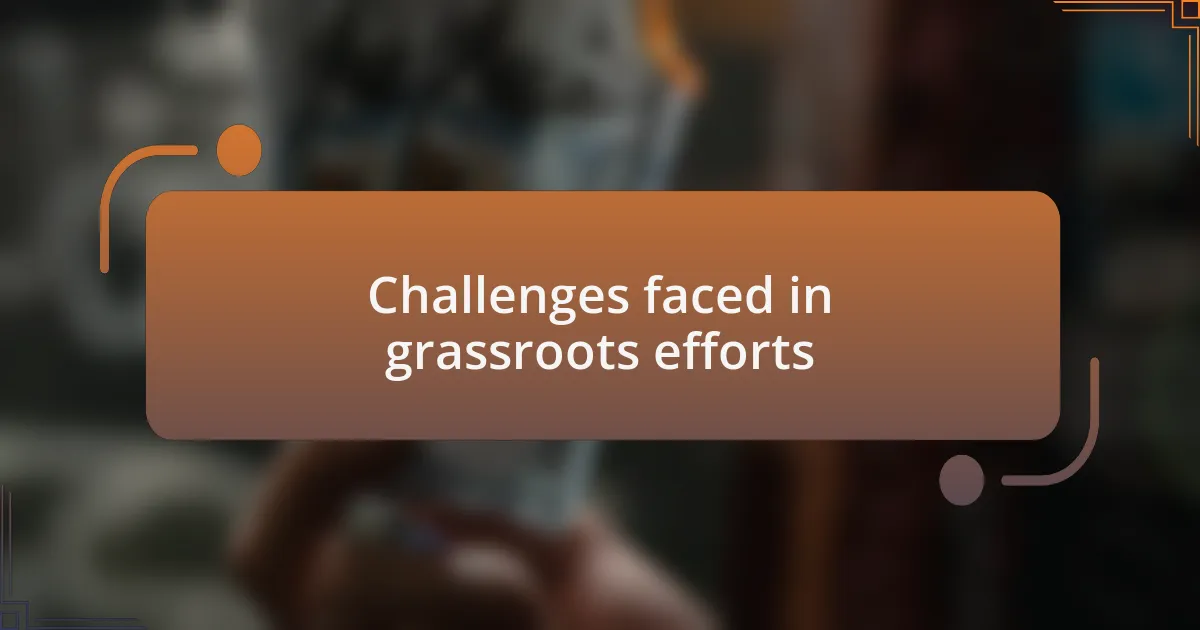
Challenges faced in grassroots efforts
Grassroots efforts often face significant hurdles, primarily due to limited resources. I remember organizing a community event when our funds fell short at the last minute, forcing us to get creative. It made me realize that sometimes, passion alone isn’t enough; we need strategic planning and fundraising to truly make an impact. How have you navigated similar resource challenges?
Another challenge is the variance in public perception and support. I’ve experienced conversations that went from hopeful to confrontational in mere minutes, often stemming from deeply ingrained beliefs. It can be disheartening, but each uncomfortable dialogue presents an opportunity for growth and understanding. When faced with pushback, how do you turn that into a lesson for future engagement?
Lastly, sustaining momentum can be tricky in grassroots movements. I once witnessed a surge of enthusiasm during a campaign, only to see it dwindle as time passed. This taught me the importance of consistent follow-up and reminding supporters why their involvement matters. Have you ever found it difficult to keep the fire burning in your advocacy efforts?
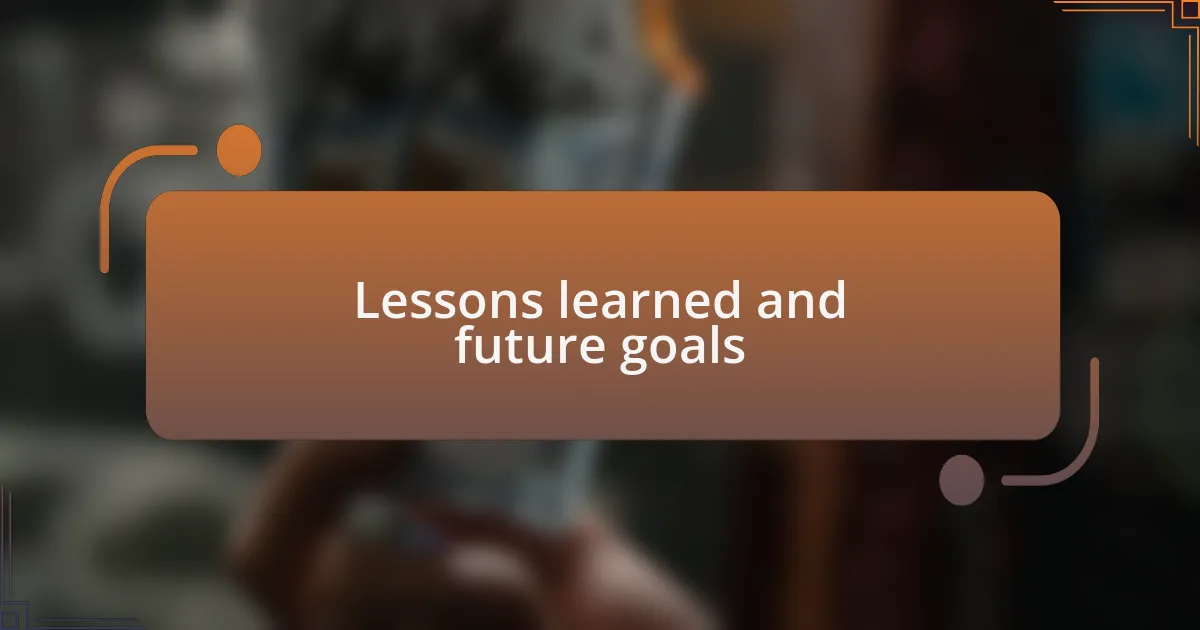
Lessons learned and future goals
Reflecting on my grassroots leadership journey, I’ve learned that resilience is key. During one campaign, we faced fierce opposition that felt overwhelming. Instead of retreating, I leaned into the discomfort, using it as a catalyst for deeper dialogue. How can we transform our toughest challenges into stepping stones for future success?
I’ve also discovered the power of community connection. I vividly remember the sense of camaraderie that emerged when we hosted brainstorming sessions with local supporters. Those conversations not only solidified our bond but sparked innovative strategies that we hadn’t considered before. What partnerships have you cultivated that have propelled your mission forward?
Looking ahead, my goal is to create more structured training programs for upcoming advocates. I believe that empowerment through education can change the landscape of our efforts. In my experience, equipping others with the tools and knowledge I’ve gained fosters a ripple effect of advocacy. How can we better prepare the next generation of leaders to carry this crucial work forward?